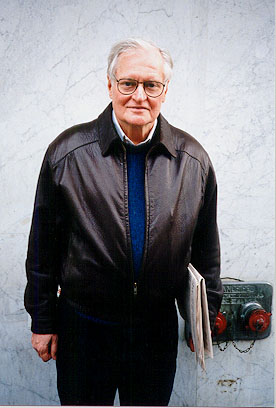Thursday, December 24, 2009
Akron/Family
Check out a bit of it here:
If you enjoyed that, check out the entire set here:
Interview here:
I saw these guys three times at South by Southwest in Austin, Texas last year. Shane and I traded whiskey shots with the drummer, where I drunkenly tried to make him promise to play in Lincoln over Omaha whenever they finally play in Nebraska. Still hasn't happened.
Tuesday, December 22, 2009
A Poem
Dream Song 29
by John Berryman
There sat down, once, a thing on Henry's heart
só heavy, if he had a hundred years
& more, & weeping, sleepless, in all them time
Henry could not make good.
Starts again always in Henry's ears
the little cough somewhere, an odour, a chime.
And there is another thing he has in mind
like a grave Sienese face a thousand years
would fail to blur the still profiled reproach of. Ghastly,
with open eyes, he attends, blind.
All the bells say: too late. This is not for tears;
thinking.
But never did Henry, as he thought he did,
end anyone and hacks her body up
and hide the pieces, where they may be found.
He knows: he went over everyone, & nobody's missing.
Often he reckons, in the dawn, them up.
Nobody is ever missing.
Monday, December 21, 2009
Winter Solstice
Backstage Sessions : AA Bondy - Black Rain, Black Rain from Hard to Find a Friend on Vimeo.
Thanks for the heads up, Jeff.
Wednesday, December 16, 2009
Tuesday, December 15, 2009
Up
Friday, December 4, 2009
Grizzly Bear
Tuesday, December 1, 2009
On One's Own Writing
Thank you for your letter. It is always pleasant to learn that someone takes an interest in a work which one enjoyed writing. In the past I have declined to comment on my own work: because, it seems to me, a poem is what it is; because a poem is itself a definition, and to try to redefine it is to be apt to falsify it; and because the author is the person least able to consider his work objectively. Though as for the last, one certainly has to try. However, I liked your letter, and I have a great curiosity about Vancouver, so I'll see if I can think of anything that may be of use to you.
Of the ideas you suggest, the one that seems closest to what I might think is that of "an art where everything is ambiguous until superimposed into an entity." To change your phrase somewhat, I know that I like an art where disparate elements form an entity. DeKooning's work, which I greatly admire, has less to do with it than that of Kurt Schwitter, whose collages are made of commercial bits and "found" pieces but which always compose a whole striking completeness.
I had no religious intention, though I see why a poem whose "idea," if we may call it such, is that of an essential harmony, or perhaps congruity is a better word, might suggest one. However, intention needn't enter in, and if a reader sees things in a religious way, and the work is dogmatically acceptable, then I don't see why it should not be interpreted in that way, as well as in others. In this case, though, I really can't see that purification comes in at all. Part of the point would seem to be that junk like the trucks and the lions, and things that matter, like flowers, the sea, a mother and her baby (in an ascending scale of value) have each its place, and that it is the world in its impurity which is so very beautiful and acceptable, if only because one has so little choice.
As for evocation/communication, I don't find the first separate from the second, though subsidiary to it. The aim of the poet, or other artist, is first to make something; and it's impossible to make something out of words and not communicate. However, if a poem can be reduced to a prose sentence, there can't be much to it. Someone, I believe, has said that "what a poem communicates is itself." This seems to me true.
I am not quite sure what you mean by the "development" of the poem. If you mean in the sense it's used in music, I hope it's there in the poem; anyway I have nothing to add to it. If you mean how I came to write it, well, let's see.
It was late February and I had very recently returned from Europe, where for the first time I had visited Palermo, and made an excursion to see the temples at Agrigento (where there were also wild snap-dragons in bloom among the lion colored drums of fallen columns), a rather dusty and disappointing affair at the time, but which was a pleasure to recollect. The day on which I wrote the poem I had been trying to write a poem in a regular form about (I think) Palermo, the Palazzo Abatelli, which has splendid carved stone ropes around its doors and windows, and the chapels decorated by Serpotta with clouds of plaster cherubs; the poem turned out to be laborious and flat, and looking out the window I saw that something marvelous was happening to the light, transforming everything. It then occurred to me that this happened more often than not (a beautiful sunset I mean) and that it was "a day like any other," which I put down as a title. The rest of the poem popped out of its own accord. Or so it seems now.
I do not usually revise much, though I often cut, particularly the end or toward the end of a poem. One tends to write beyond what's needed.
It seems to me that readers sometimes make the genesis of a poem more mysterious than it is (by that I perhaps mean, think of it as something outside their own experience). Often a poem "happens" to the writer exactly the same way it "happens" to someone who reads it.
As for stimuli, I hope you won't "perceive a similar response" in this instance, since what stimulated me to write was the apathy following on the disappointment of a wasted day. However, what seemed like waste then may have been warming up. Who knows? Not me.
- James Schuyler


